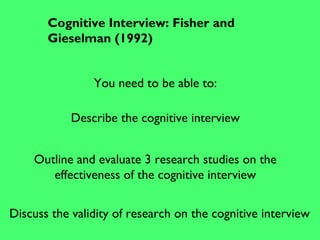
Cognitive interview
- 1. Cognitive Interview: Fisher and Gieselman (1992) You need to be able to: Describe the cognitive interview Outline and evaluate 3 research studies on the effectiveness of the cognitive interview Discuss the validity of research on the cognitive interview
- 2. A way of interviewing eyewitnesses to improve the accuracy and detail of their memory of a crime. It is based on what psychologists have found out about memory. Memories for events like crimes are made up of lots of different types of information stored in different parts of the human memory system. The cognitive interview is:
- 3. More accurate and detailed memories can be recalled if interviews help the witness to access and retrieve information from different parts of their memory system. The cognitive interview is intended to do this by helping the witness to reconstruct the original context of the crime and retrieve lots of different information about the crime stored in memory.
- 4. You need to be able to describe the cognitive interview. You need to be able to describe the 4 main components of the cognitive interview. This is your main AO1 material. 1. Report everything - include every single detail of the event, even if it is minor or not directly related to the crime. This is intended to improve the detail and accuracy of the memory of the crime. 2. Mental reinstatement of the original context - mentally recreate the situation at the time of the crime. This is also intended to improve the detail and accuracy of the
- 5. 3. Change the order - reverse the order of what happened. This helps to access more information about the crime stored in memory. 4. Changing the perspective - recall the crime from many different points of view, e.g other witnesses, the person carrying out the crime, the victim. This allows the eyewitness to retrieve more information stored in memory.
- 6. Evaluation Research evidence: 3 studies are enough. This can be used to help you answer AO1 questions on research and as AO2 material in extended writing questions.
- 7. Kohnken et al conducted a meta analysis of 53 studies and found a 34% increase in correct recall using the cognitive interview compared with standard interview techniques. This is support for the cognitive interview as a better way to interview eyewitnesses than standard interview techniques.
- 8. Milne and Bull conducted a lab experiment using college students and children and found that using component 1 and 2 of the cognitive interview (report everything and mental reinstatement of the original context) produced better recall of the crime than just using one component. This supports the claim made by Fisher and Gieselman that using many different ways of accessing information improves the accuracy of eyewitnesses memory for events like a crime.
- 9. Stein and Memon tested female cleaning staff in Brazil and found that the cognitive interview increased the amount of details remembered about a crime. The details remembered were often useful to the police including important details like a description of the criminal. This is further support for the effectiveness of the cognitive interview with a more representative sample of participants and suggests the cognitive interview is effective with ordinary people as well as students.
- 10. Validity Many of the studies on the effectiveness of the cognitive interview are lab studies that used videos of crimes. The participants were often students. The findings may be valid for the experimental situation but may not generalise to real life interview situations.
- 11. Real life interview situations are difficult to investigate. Many police forces do not use the 4 stages of the cognitive interview. Some police forces only use one or two components. It is therefore hard to establish how effective the cognitive interview is in improving the accuracy of eyewitness recall.
- 12. Many police forces that have been trained to use the cognitive interview don't use it. It is expensive and takes time to carry out.
- 13. Conclusion: The cognitive interview is based on psychological research into memory and has proved effective in improving the accuracy of eyewitness memory but it is expensive and time consuming to carry out and many police forces do not use it.